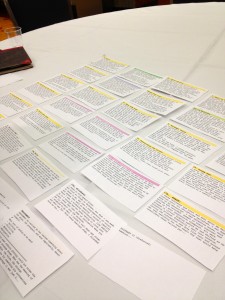 Words achieved today: 3045 (letting myself get away with less because it’s a teaching day, but maybe I’ll get in a few more tonight)
Words achieved today: 3045 (letting myself get away with less because it’s a teaching day, but maybe I’ll get in a few more tonight)
Current Hearts of Tabat wordcount: 87687
Total word count for the week: 13067
Total word count for this retreat: 13067
Worked on Hearts of Tabat, Exiles of Tabat, short story (“You Remind Me of Summer”)
Time spent on SFWA email, discussion boards, other stuff: 30 minutes, plus whatever I do tonight
Other stuff: Taught the first section of “Writing Your Way Into Your Novel”, prepped for Sunday’s class
Steps: 6410
From Hearts of Tabat:
Adelina paused by Serafina’s desk. She studied the secretary, who looked up. She wore her usual plainly cut clothes, one of the signs of a worshipper of the Moon Temples. That was, as far as Adelina could, Serafina’s only similarity with Eloquence, but most of what Adelina had ever known of the temples previously had been via the instruction or example of her secretary.
She asked now, “Serafina, how does the Temple handle marriages?”
“The priests arrange them, when people are ready,” Serafina said.
“How does the priest know when they are ready?”
“They come and ask the priest to find them someone, and they prove in conversation that they are ready to be with someone in that way, and to begin to raise a family.”
“Is that the point of the alliance, the family?” Adelina said, intrigued. “Are there Triad marriages, as there are among the merchants?”
She felt foolish as Serafina eyed her. I am treating her as though she were some sort of menagerie creature, she thought, and that is unkind. Shame twitched at her even harder when Serafina patiently said, “No, our marriages are not about economic alliances in the way that merchant marriages are. Such alliances would be reckoned a little sinful because they are apart from the norm, truth be told.”
“What is their purpose then?”
“To create children, who will spread the faith.”
“Should the faith not spread it, if it is good enough?” Adelina asked, fascinated, and realized her misstep when she saw Serafina’s frown. “I beg your pardon,” she said quickly. “It is only that”¦”
“It is only that the Moon Temples are not much regarded among the merchants and the nobles because it is a religion of the poor,” Serafina said frankly. “To speak of things that are not reckoned in profit or loss is thought a little shameful among the merchants, and the nobles do not like talk of doing good for its own sake.”
That startled a laugh out of Adelina, who had never heard her clerk be so cynical. “What has flushed all this truth from you, then?”
“You should not pay attention to Eloquence Seaborn,” Serafina said severely. “It is not a match the Temples would approve of, and he is a fine young man, with a good future in them ahead of him.”
“Is he to become a priest?”
Serafina shook her head, then nodded. “A layman’s priest, someone who does not live in the Temples and do as the Priests do, but lives among other people and acts as a go between and an example. That is a special role, and it is the one that has been prepared for Eloquence.”
It occurred to Adelina that the Temples were a relatively small gathering and so Serafina had known Eloquence and his family all her life. She said, “I am thinking of taking an apprentice, one of Eloquence’s sisters.”
“That,” Serafina said slowly, “could be a good or bad notion, depending on which you mean to do so with.”
“The youngest one. Perseverance.”
“Ah.” Serafina’s frown cleared a little. “She gets picked on by the rest of them, I think. To be out from under all of that would be a good thing for her, let her shine a little and come into her own. But I thought she was apprenticed to the tanner?”
“She is, but she says she hates it. I found her crying over it.”
Serafina pursed her lips. “It is not for the child to determine her own apprenticeship. That is for her elders to do, with the Temples’ advice, in order to place her where she will be best prepared for life.”
“But at the time she was apprenticed to the tanner, this opportunity was not available to her for the Temples or her elders to know about,” Adelina pointed out.
“That is true.” Serafina wavered. “You should consult her brother,” she said finally.
“I will,” Adelina said. She did not mention her earlier conversation with Perseverance or the fact that she had already promised the girl an apprenticeship. There was no need for Serafina to know the exact timeline.






